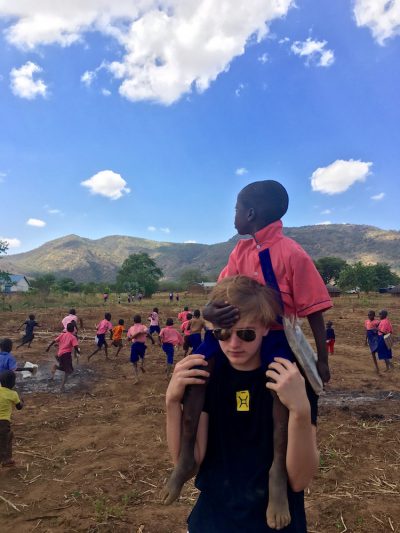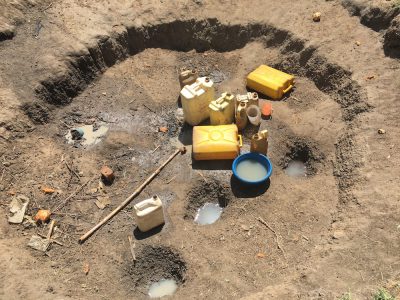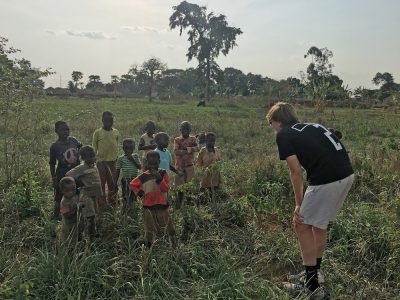
I will never look at water the same way. Water is everything to the people of Uganda and witnessing that and seeing how it changes their lives was amazing. Though the ASL community sees water as a casual drink or simply for washing hands, it’s so much more. To people in other places, water is everything: health, life, and hope. In 2013 there were almost 2.5 billion people in the world without clean water, and after seeing some of those 2.5 billion, I now realize the importance and the urgency of the world’s water crisis.
Over spring break my family and I took a trip to Uganda with a charity called Charity: Water, which is a non-profit charity that builds wells all over the world for people who don’t have access to clean water.
This trip was life changing. We landed in Entebbe and took a smaller plane up to Gulu and landed on a dirt runway. Although I was scared out of my mind, seeing hundreds of kids and adults coming to watch us land, fascinated by our planes was amazing. We then drove to different villages across Uganda.
Arriving in these villages was like arriving on set of a movie. They were living in huts made with only straw and mud. There were chickens and cows all around. It was like taking a step back in time. They would sing and dance as we arrived and shake our hands and bow as they met us. We had translators to help us communicate and converse with the residents of each village.
They were fascinated by our houses in the sky (apartments) and our excessive use of water. The average family of eight in Uganda uses about two jerry cans of water a day (1 jerry can = 5.3 gallons) and the average American uses 33 jerry cans a day. As we told them this, they were in disbelief, shaking their heads in pure shock.
At one of the villages, they had to walk 5 kilometers to get their dirty water, carrying loads of weight. I first saw the jerry cans and I thought “I can so do that,” so I asked one of the ladies if I could help her carry it. I carried a jerry can all the way back, and it probably took me ten times longer than the women, who would laugh as they passed. By the time I finished, I was dying and couldn’t feel my arms. The other ladies were completely fine carrying two in their hands and one of their head. They travel so far to simply obtain dirty water, and water is at our fingertips.
The first villages we visited had received a Charity: Water well and had clean water. We talked to them about the change that clean water has made in their lives and how it affects them now. The effect that water has on these people is extraordinary. It gives the children time for school, the women time for personal hobbies and maintaining their homes, and so much more.
The farther east we drove was like taking a step farther back in time. We started to go to areas that had no clean water, and it was heartbreaking. Seeing little children drink brown water killed me. I still tear up just thinking about it. We walked to dry water holes that people were digging in, desperately trying to find any water.

When we finally arrived to where people had found clean water, I immediately started crying and almost fell to my knees. Seeing these children the same age as my brother and sisters drinking brown murky water that goats were drinking out of was one of the worst things I’ve ever witnessed. I wanted to scream stop, but all they know is to drink that dirty water. They don’t even know how bad the water they are drinking is.
We talked to mothers who lost children to illnesses caused by contaminated water. It was heartbreaking. I met one lady who lost her children and her husband to awful cases of diarrhea. Diarrhea causes death by making people dehydrated so they keep drinking the bad water and the case just gets worse and worse until you die; it’s a vicious cycle.
Our next stop was a school with clean water. This school was in the middle of nowhere. We drove over what weren’t even roads but just fields along the African savannah. We finally arrived at a ghost-like windowless structure that was the school. We entered the different classrooms and were in disbelief. In a classroom even smaller than our ASL classrooms there were 96 little kindergarteners. You just saw dozens of little heads packed onto wooden benches.
While the teacher was writing on the board, we heard the children singing. We asked the teacher why they sang so much and his answer left me speechless with tears swelling up. The teacher told us that he kept the children singing in order to keep them from thinking about how hungry they are because they don’t have enough food to eat. This hit me so hard, knowing I can easily go get as much food as I want right now.
Throughout the trip, I was constantly holding little children and putting them on my shoulders because they had never experienced anything like that before.
We talked with the kids, and they are just like you and me, but they just live under different circumstances that cause unfair disadvantages. My family and the charity water people then played soccer with the kids and got absolutely schooled.

Before I left, I talked to a little girl who had to walk three hours to school every day and home another three hours. It made me think about how I just simply get onto the bus and go straight to school. I could never imagine walking that far just to travel to school and back home, and that little eight-year-old girl does it everyday barefooted. This was incredibly eye opening for me as we drove back to the place we were staying.
Finally, we spent one of our last days in an orphanage. This was one of the most joyful and painful days of my life. Meeting these children who don’t have families but were still so happy and grateful was inspiring. They were constantly all over me asking to play with them and pick them up. Some of the kids even started calling me “uncle Reeves” by the end of the day. Though this made me happy, it was also hard.
We talked to the lady who runs the orphanage, and she told us of the tragic backgrounds of these kids. Some were left in huts for days; others were buried alive in deep holes used for toilets. One boy named Kato told me that his parents were still coming to get him even though they left him in a hole. I tried my hardest to stay strong as I lifted him and he called me “uncle Reeves” but I honestly couldn’t, knowing how hard his life was; it just left me in tears. Despite his hardships, he was still smiling. I couldn’t stand to leave the kids and can only hope their lives get better.
The trip left me in pure shock, disbelief, and appreciation. Everything in the world we have is a blessing that is overlooked, from our showers to our families. We have so much in life that we think of as normal things when, really, they mean so much more.
In my newly appreciative perspective on life, I decided to give my 15th birthday to Charity: Water. I’ve raised almost $6,000 so far and I’m hoping to reach my goal of $10,000 to build a well. Giving is still possible at https://tinyurl.com/ReevesWater if people are interested in donating.
Though giving is wonderful, the big thing to take away from this is to appreciate everything you have. So the next time you pour yourself a glass of water, look at just how clear and clean it is and think about just how lucky you are to have that one glass, because having clean water is a gift not everyone has.
